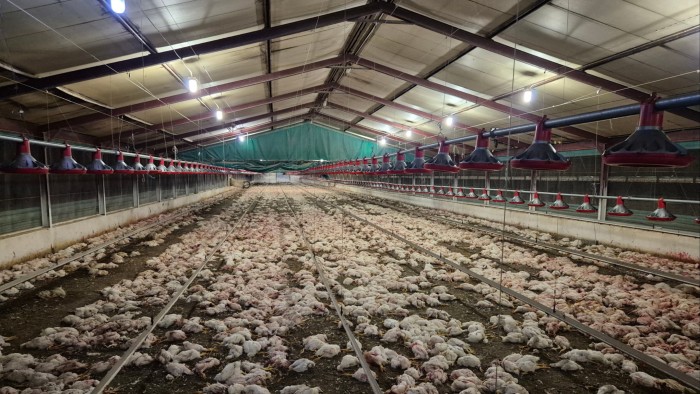Unlock the Editor’s Digest for free
Roula Khalaf, Editor of the FT, selects her favourite stories in this weekly newsletter.
South Africa’s parliament will summon its state pension fund manager to explain how the failure of a poultry farm it owns ended with thousands of starving chickens resorting to cannibalism in a case that has sparked outrage in the country.
Some 350,000 birds at Daybreak Farms sites in Mpumalanga, an hour east of Johannesburg, were left starving after the company ran out of money to buy feed and pay its workers. That forced an animal welfare organisation to send an emergency team of 75 staff to euthanise the birds this week.
This incident is the latest example of a company supported by taxpayer funds hitting the wall amid allegations of misgovernance and a lack of proper oversight and accountability.
“What we found was horrifying — many of the chickens that were still alive had such large holes in their bodies from being cannibalised by the other birds that you could see their internal organs,” said Nazareth Appalsamy, an inspector at the National Council of Societies for the Prevention of Cruelty to Animals, who was part of the operation.
In 2015, South Africa’s state-run pension manager the Public Investment Corporation, which manages R2.7tn ($148bn) on behalf of more than a million civil servants, financed the purchase of Daybreak by a consortium led by Matome Maponya Investments.
But Daybreak soon ran into financial trouble, with whistleblowers citing poor governance. In 2017, the PIC took full control of Daybreak and injected more funds to prevent it collapsing. While the PIC subsequently overhauled Daybreak’s board, this failed to stem the losses.
The NSPCA has now lodged criminal charges against Daybreak’s management under the Animal Protection Act, the penalty for which is a criminal conviction and a jail term of up to a year. “This is not something we have seen at such a scale before,’ Appalsamy said.
Songezo Zibi, the chair of parliament’s Standing Committee on Public Accounts, told the Financial Times that the PIC would be summoned to answer questions on its investment portfolio in the next few weeks.
“Daybreak Farms is definitely on the agenda,’’ he said. ‘‘This is important since public funds were used to invest in the company where it seems there has been significant governance failures.”
Demonstrations outside a Daybreak Farms abattoir in Mpumalanga by the company’s workers turned violent this week, with police firing rubber bullets at protesters.
The workers said they have not been paid since March. One employee told a local publication that the farm workers have “no income, no food, no transport money, no ability to pay rent, school fees, or debts”.
The PIC said on Wednesday that it was “deeply disturbed” by the reports about Daybreak. “The board and management of Daybreak are responsible and accountable for the operations and finances of the company. The PIC continues to [provide] support to Daybreak and has provided capital allocations [to] stabilise the business,” it said.
Daybreak acknowledged “recent challenges related to animal welfare’’ at its poultry farming operations. It told the FT that given its “significant financial constraints”, the company was “exploring options to place the company into Business Rescue”, a form of bankruptcy protection that allows it to restructure its debts.
Daybreak added that the company had made “numerous requests for funding” to the PIC, but was still waiting for a response.
The incident marks a dramatic end to what had been described as a “landmark transaction for Black ownership in the agricultural sector”.
Critics say the state’s investment in Daybreak Farms was an example of how the country’s affirmative action policy of Black Empowerment, designed to introduce economic equality following apartheid, had been derailed by transactions that benefited politically-connected individuals.
“There have been numerous complaints made to government authorities over how Daybreak was being managed for years but none of these went anywhere, presumably because of its political connections,” said Tertia Marshall, a member of the opposition political party in the area, the Democratic Alliance.
“This is an indictment of how Black Economic Empowerment has been implemented,” Marshall said.
https://www.ft.com/content/95f752c3-3fe5-4dcf-bfb6-08e91c8f1533


